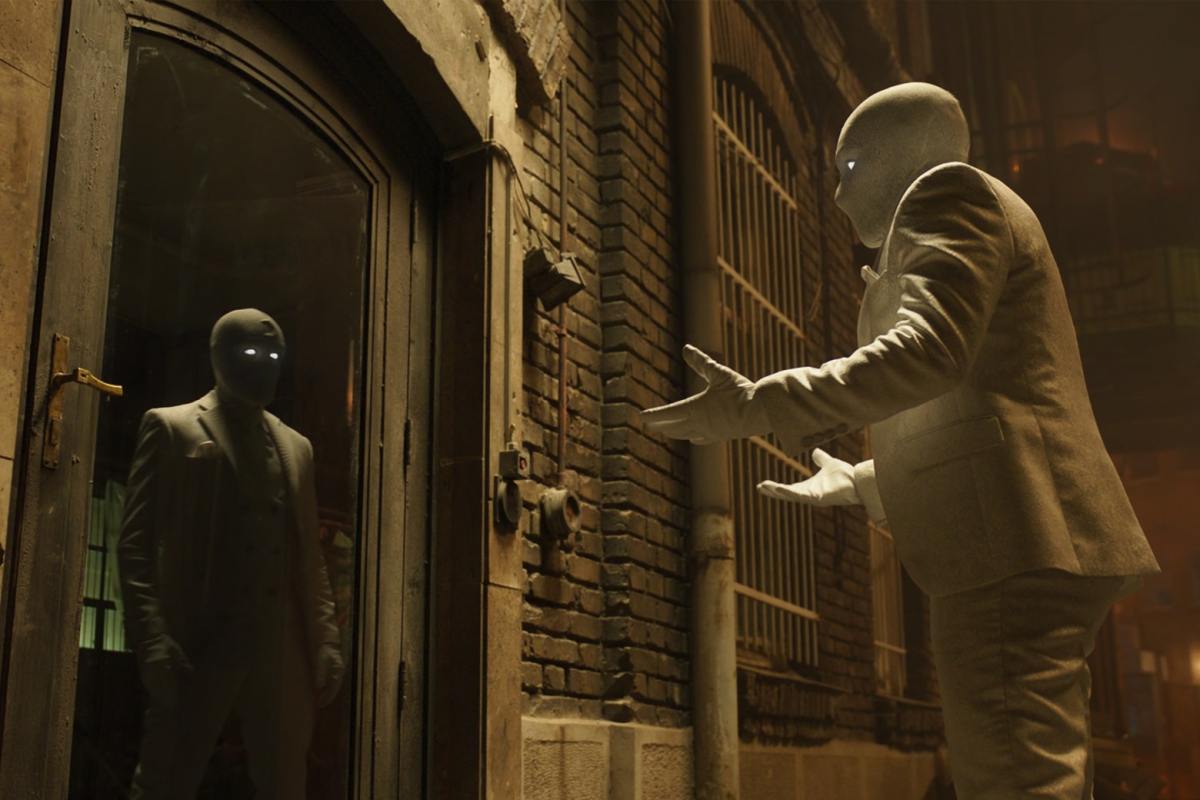This discussion and review contains some spoilers for Moon Knight episode 2, “Summon the Suit,” on Disney+.
One of the most frequent criticisms of Marvel Studios projects is that they have a “villain problem.”
To be fair, this problem is somewhat overstated. After all, the company has managed to produce memorable villains like Loki (Tom Hiddleston) in Thor and Killmonger (Michael B. Jordan) in Black Panther. More than that, the company’s decision to favor character development of heroes over villains makes sense in a genre where villains have historically overshadowed heroes, particularly since the structure of the franchise means the hero will be the one sticking around for the sequels.
Moon Knight adopts a particularly interesting approach to this long-standing structural issue, in that it is essentially a superhero story where the central character functions as both hero and villain. In both “The Goldfish Problem” and “Summon the Suit,” Steven Grant (Oscar Isaac) seems at least as much at odds with his dissociative personality Marc Spector (also Isaac) as he is with anything else in the narrative. Grant is fighting for control of his body and his life, for an agency that Spector seeks to rob.
Moon Knight does offer a fairly conventional antagonist in the form of Arthur Harrow (Ethan Hawke). However, Harrow is a somewhat broadly drawn foil for Grant and Spector. Arthur Harrow is an extremely minor comic book antagonist, having only previously appeared in a single issue of Moon Knight from April 1985. He is hardly a baddie as popular or as ubiquitous as Baron Zemo (Daniel Brühl), Wilson Fisk (Vincent D’Onofrio), or even Agatha Harkness (Kathryn Hahn).
More than that, “Summon the Suit” suggests that Harrow is a fairly conventional comic book adaptation villain. He is a fascist who is drawn in the broadest possible terms, doing terrible things in pursuit of some utopian ideal. In that way, he is similar in broad strokes to villains like Thanos (Josh Brolin). Harrow argues for what is effectively a more extreme sort of vigilantism that seeks to make the world a better place by “eradicating the choice of evil.”

Harrow follows the Egyptian deity Ammit, who has the power to judge a human life in aggregate and upon its potential. “She knows what we’ve done and what we will do,” Harrow explains in “The Goldfish Problem.” It’s essentially a pseudo-religious riff on pre-crime from Minority Report. It is also similar to “Project Insight” from Captain America: The Winter Soldier, which would use an algorithm to identify potential future problems and “neutralize a lot of threats before they happen.”
This is so obviously and transparently evil that it renders Harrow largely inert as a character. Harrow offers Grant a tour of his local community, but there is no real sense that Moon Knight expects his argument to be compelling. “Isn’t that a bit dodgy?” asks Grant of Harrow’s methods. “A thought can’t be evil, can it?” When pressed, Harrow doesn’t just acknowledge that he would happily kill a child in service of Ammit; he seems actively gleeful at the prospect.
Harrow is most interesting in the context of the revelation that he was a previous avatar for Khonsu — that he formerly served as “the fist of vengeance.” He served the same function as Grant and Spector. He perhaps serves as a cautionary tale. This information provides some solid context for the opening scene of “The Goldfish Problem,” suggesting why Harrow might have wanted to shatter a glass object and why he would walk around with the pain of those fractures. In his own way, he is a mirror to Grant.
Indeed, this serves to put Harrow’s fascination with preemptive violence in perspective. Harrow argues that his methodology is just an extension of Khonsu’s philosophy. Khonsu insists that he enacts “real justice” by brutally beating those who have committed crimes, but Harrow offers a reasonably sound criticism that such violence doesn’t actually prevent the suffering caused by the crime. Harrow has simply internalized what Khonsu taught him and extrapolated it.

It’s a small aside within the larger episode, but it is an interesting criticism of so many modern superhero narratives that equate justice and violence. In some ways, it illustrates the limitations of the modern genre. The argument between Harrow and Khonsu completely ignores that it might be possible to enact justice without violence, that superheroes can do more than just beat up or kill people. It demonstrates how astute The Batman was in its commentary on the genre.
However, Harrow is largely an abstraction. “Summon the Suit” implies Grant’s real conflict is with himself. The episode reinforces this point in its choice of external antagonists for the hero. Harrow is just a cautionary tale of what might happen if Grant gives himself over to vigilantism. Even the invisible beast that wrestles with Grant through London visualizes the metaphor. Grant’s body seems to jerk and move under its own power. “Do you reckon he’s having a seizure?” asks one onlooker.
It is a cliché to suggest that a character is their own worst enemy. However, many of the best shows of the current century have been built around protagonists who consistently self-sabotage. In The Sopranos, Tony Soprano (James Gandolfini) refuses to do the hard work to become a better person, becoming a cancer on the lives of those around him. In Breaking Bad, Walter White (Bryan Cranston) is more undermined by his own ego than by worthy adversaries like Gus Fring (Giancarlo Esposito).
Moon Knight literalizes that central drama in a way that befits the heightened melodrama of superhero storytelling. Early in “Summon the Suit,” Grant confronts Spector. He finds himself arguing with the “man in the mirror.” He believes that Spector’s choices have defined and shaped his life, robbing him of autonomy and agency. It’s Spector’s actions that cost Grant his job. It’s Spector’s actions that cost Grant his date. Spector is the living embodiment of Grant’s self-sabotage.

The structure of Moon Knight plays into this antagonism. Spector spent most of “The Goldfish Problem” as an unknown and externalized force. The audience was invited to witness events from Grant’s perspective. Spector was akin to a movie monster, the reason that Grant had to chain himself into bed at night. Spector was disruptive, but he was also presented as mysterious. It is notable that Grant converses with Harrow much earlier than he actually talks to Spector.
The two personalities trapped within the same body are stuck in an existential struggle. Both are clearly playing to win, to dominate the other by force. When Spector tries to force the issue, Grant threatens to destroy both their lives. “I’m going to take this bag, full of illegal shit, yeah?” he explains. “And I’m going to go straight to the authorities, and they’re going to put me away so I don’t hurt anyone else. And hopefully, NHS will fill me with enough pills so that you get out of my head.”
It is worth noting that dissociative identity disorder is a real psychiatric condition, although it often bears little similarity to depictions in popular culture. It is often sensationalized in film, television, and particularly comic books. There has been understandable scrutiny around the potential portrayal of the character’s mental illness since the Moon Knight streaming series was first announced. Marvel Studios worked with psychiatrist Dr. Paul Puri to ensure a fair portrayal.

However, the psychiatric condition also works as an evocative metaphor. It provides a way to visualize and narrativize the internal conflict within a given character. Grant and Spector are essentially fighting over which version of this person is the true self. It is also a potent metaphor for the process of reconciling with difficult and competing facets of oneself, of integrating different aspects of a person into a singular cohesive identity.
It’s an intriguing twist on the classic superhero template, which often riffs on similar ideas through the metaphor of secret identities that allow a given character to present two diametrically opposed versions of themselves to the world. Moon Knight just makes that tension much more explicit and allows those different projections to engage in conversation with one another. In a very real sense, the title character of Moon Knight is both the hero and villain of his own story.
Grant and Spector are their own worst enemies, which is a handy way of getting around one of the most consistent problems facing Marvel Studios.






Published: Apr 6, 2022 03:30 pm